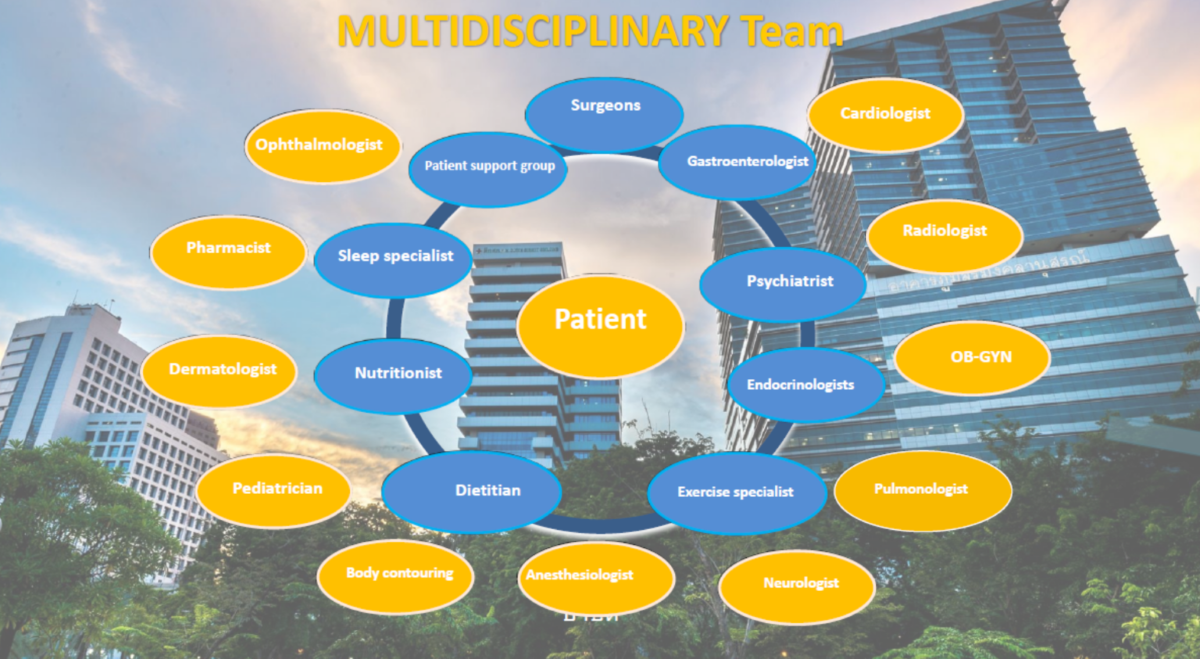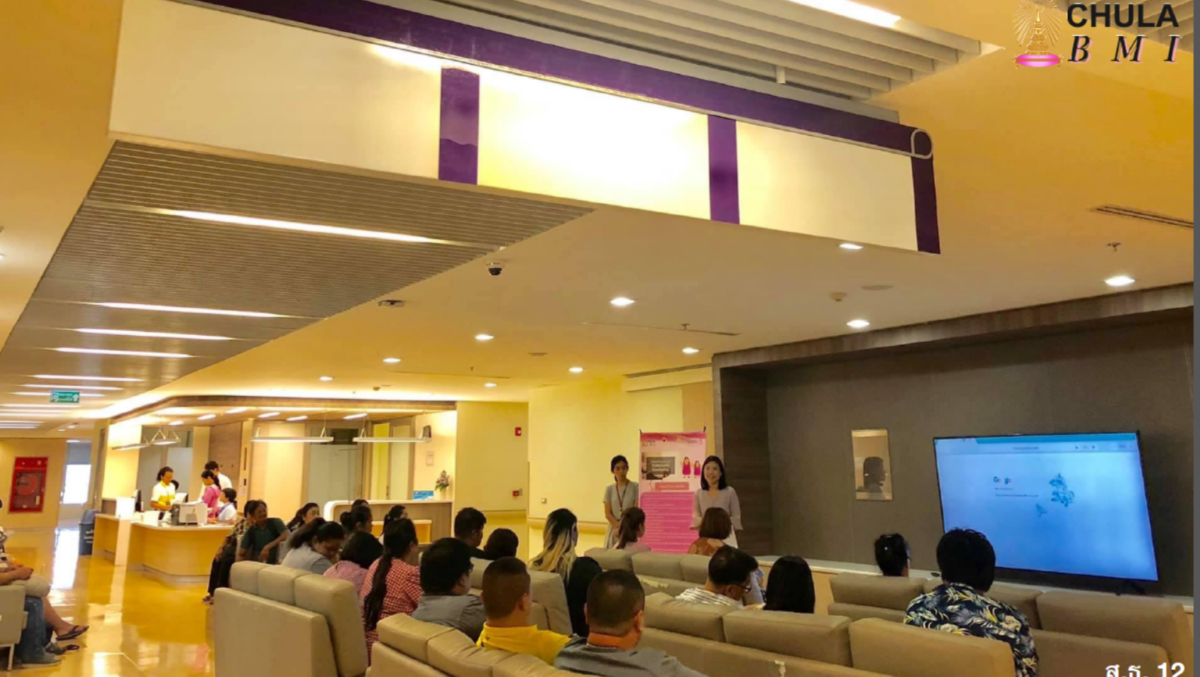Say goodbye to obesity with the Chulalongkorn Bariatric and Metabolic Institute (Chula BMI)—King Chulalongkorn Memorial Hospital‘s one-stop center for comprehensive, holistic obesity care. A team of doctors and multidisciplinary specialists, including experts in medicine, surgery, nutrition, and behavioral therapy, is now ready to provide patients with guidance on preventing obesity before it’s too late.
Are you obese?
Find out from the BMI formula.
Body mass index (BMI) = body weight (kg)/height (m) 2
- If your answer is between 14.9 – 24.9, you are within the norm.
- If your answer is between 25 – 29.9, you are entering an overweight threshold.
- And if your answer is more than 30 or so, you are obese!
“For those whose BMI exceeds 25, it’s time to take care of their physical health,” said Professor Suthep Udomsawaengsup, M.D., a bariatric surgeon and Director of Chula BMI.
Obesity is a health problem that should not be overlooked because it causes many diseases, including diabetes, high cholesterol, neurological diseases, stroke, sleep disorders, high blood pressure, heart disease, lung disease, Gastroesophageal Reflux Disease (GERD), infertility, cysts, kidney abnormalities, urinary incontinence, abnormal stools, varicose veins, fatty liver, cirrhosis, gallstones, and breast and ovarian cancer.
“The treatment of obesity and weight loss is possible if the patient is continuously treated and under the close supervision of a doctor and the multidisciplinary team,” Prof. Dr. Suthep gave his reassurance: “At Chula BMI, we are a model for obesity care, offering comprehensive knowledge, expert specialists, and a full range of treatment options. We bring together all sectors involved in managing obesity and metabolic diseases under one roof.”
Professor Dr. Suthep revealed that Chula BMI was established in 2007. Each year, about 2,000-3,000 patients undergo nonsurgical treatment for obesity, while about 120-150 patients receive surgical treatment.
“Some of the patients who completed the surgical treatment returned as speakers to educate and exchange experiences with patients during the treatment period and to encourage those who are about to be treated,” Prof. Dr. Suthep gave an example of success in “removing the belly from patients’ lives.”
One-Stop Service for Holistic Obesity Treatment
Chula BMI brings together physicians and professionals in allied sciences, such as endocrinologists, because several obesity cases are caused by endocrinological disorders; pulmonologists; otolaryngologists; nasopharyngologists, and neurologists to take care of sleep issues. Nutritional specialists take care of the nutrition area, as it is one of the crucial factors in obesity. Gastroenterologists take care of surgery, psychiatrists provide counseling on psychological conditions, pediatricians take care of children with obesity, plastic surgeons reshape the body for aesthetic purposes, and gynecologists take care of infertility caused by obesity, ovarian cysts, and ovarian cancer. Radiologists are responsible for detecting gallstones, while cardiologists treat patients with heart-related conditions.
In addition, other personnel are also on staff, such as physiotherapists providing rehabilitation care, the Faculty of Sports Sciences responsible for exercise routines, and dietitians responsible for nutrition. Patients and their families, as well as the Patient Support Group, also provide encouragement and support by exchanging experiences.
Professor Dr. Suthep detailed the process of receiving treatment at Chula BMI. “When arriving at Chula BMI, we will first group patients to sit through an orientation of the process of treatment process. After that, the patient will receive an individual examination. It is a one-stop service to ensure ease and privacy for patients. We also serve as a hub for the exchange of ideas among multidisciplinary professionals and patients’ families, whom patients must bring along. Because, when patients return home, they will need to be taken care of and encouraged.”
Tackling Obesity Together
Professor Dr. Suthep explained the treatment guidelines for those with a BMI of 25 or more as follows:
Those who have a BMI of 25-29.9 are classified as overweight. This group starts to have severe diseases and needs to begin taking care of themselves more. The key to self-care is to focus on diet and exercise. The center has dietitians to take care of the patient, along with group treatments, so that patients can help encourage each other to take care of their health.
If patients have a BMI of 27.5-29.9, we may add medications to the treatment to block the body from absorbing fat. These are hormones that make the body feel fuller or burn more energy in the form of injections, whether once a day, once a week, or once a month, to help adjust the way the body produces secretions. The treatment makes the body feel full faster, increases metabolism, corrects disorders, and induces faster weight loss than without the drug. However, the administering of these medications must be under the close supervision of physicians. Those with a BMI between 30 – 32.5.
People with a BMI over 32.5 and who are plagued with various diseases must be treated with gastric bypass surgery to allow the body’s hormones to restore the body’s metabolism. With decreased hunger, patients can cure themselves of obesity and various diseases.
Effective Use of Diet Pills
There are different types of diet pills, each with different directions and precautions.
Professor Dr. Suthep cautioned on the use of diet pills: “If you are going to use diet pills, it is always advisable to consult medical professionals for proper treatment and follow-up to prevent unwanted consequences because some diet pills may affect liver and kidney functions, mind, as well as mood.”
“Also, only choose the diet pills approved by the FDA, such as pills that prevent the absorption of fat or those that are synthetic body secretions to make patients feel full and less hungry. These pills have been studied to be safe, and others that are not in these groups are prohibited drugs.”
While diet pills are great for treating and controlling obesity, medical evidence suggests that the use and discontinuation of the pills on your own creates a high chance of relapse.
“We always tell patients that using medication is just the beginning of the journey toward change. Most patients require long-term medication and other ways to take care of their health.”
New Innovations to Combat Obesity in the Future
Obesity is a global public health issue. According to data from the Department of Disease Control, Ministry of Public Health, the number of people worldwide who are overweight or obese continues to rise. It is projected that in the next 10 years (by 2035), more than 1.9 billion people will be living with obesity, equivalent to one in four people globally. In Thailand, a survey found that 42.2% of Thais aged 15 and older are classified as obese.
The rising trend of obesity has driven Chula BMI to continue researching innovations to improve treatment effectiveness and reduce side effects.
“Inserting a balloon into the stomach is one method of treating obesity. Patients who undergo this treatment can lose 10-15% of their body weight, which is often enough for related health conditions to resolve. However, patients may experience bloating or discomfort during the first 1-2 weeks after the balloon is inserted. Therefore, patients need to understand the process and receive continuous follow-up care.” Prof. Dr. Suthep gave an example.
“Regarding medication, we continuously enrich our knowledge in this area for current, most effective drugs with the results closest to surgery. When multiple technologies are combined, we can treat patients in all contexts, complementing each other. Surgery remains the last option for patients who do not respond to other treatments.”
The long-term approach to studying obesity focuses on reducing surgical risks. For patients who meet the criteria for surgery but are not ready due to excessive risks, laparoscopic surgery to adjust and alter the digestive tract offers a safer alternative. Currently, this method is still under study.
Obesity: Prevention is better than a cure.
“Although Chula BMI offers comprehensive and effective treatment methods, the best way to manage obesity is to prevent it in the first place!”
Ultimately, the most effective “medicine” and treatment for obesity is understanding and support from family, loved ones, and society. This encouragement helps individuals with obesity regain their health and well-being.
“Society needs to understand people living with obesity. They haven’t simply neglected their health; factors like environment, genetics, and other conditions can make it difficult for some individuals to maintain good health. Society should show compassion and help guide these individuals out of obesity, which often comes with many related diseases and other impacts. With collective support, these patients can return to living a normal, healthy life.” Prof. Dr. Suthep concluded.
For treatment, contact Chula BMI at the Sor Thor Building, 12th Floor, No. 1873 Rama IV Road, Pathumwan, Tel. 02 256 4000.
Facebook Page: https://www.facebook.com/ChulaBMI/.
Continue reading on website: https://www.chula.ac.th/en/highlight/249268/
If you would like more information about this topic, please contact Miss Pirada Tumweerapong at (+66) 2218 3055 or email [email protected]
“Chulalongkorn University sets the standard as a university of innovations for society and is listed in the World’s Top 100 Universities for Academic Reputation, in the Quacquarelli Symonds (QS) World University Rankings 2021-2022.”



